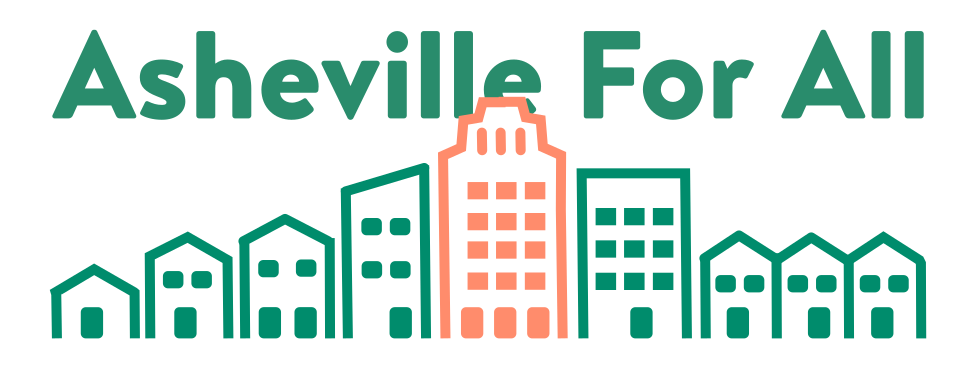Asheville For All Celebrates Buncombe County Housing Bond; Cautions That Zoning Reform Must Follow
FOR IMMEDIATE RELEASE
ASHEVILLE— Pro-housing organization Asheville For All congratulates Buncombe County voters on passing a $40 million dollar housing bond referendum on Election Day. The bond seeks to subsidize the construction of thousands of affordable homes across the County over the next seven years.
“Residents decided to put community first,” Asheville For All said in a statement. “And so in the midst of a housing supply crisis, thousands of working families will be able to find and afford homes that wouldn’t be able to otherwise.”
In Buncombe County, 48% of renters and 20% of homeowners spend more than 30% of their income on housing costs.
Asheville For All also cautions voters that much more needs to be done to address the county’s historic housing crisis. Asheville for All supports an “all of the above” approach to housing ranging from individual infill sites to multiple-home buildings and neighborhoods.
“Don’t believe anyone that says they have the one silver bullet that will make the region affordable for all,” says Andrew Paul, one of the group’s lead organizers. “Subsidies for income-restricted housing are necessary but not sufficient. We also need to update land use rules, ones with roots in classism and racism, that limit the construction of apartments and owner-occupied multi-family homes.”
Rowhouses, duplexes, and apartment buildings are currently illegal to build in much of the County and its municipalities because of development ordinances that housing activists, scholars, and White House officials all refer to as “exclusionary zoning.”
These ordinances can prevent builders from creating new homes where they are most desired, in places that are close to jobs, infrastructure, and public transit. Builders may request Variances, Special Use Permits, and Conditional Zoning within zoning reviews, but these processes can be lengthy and costly.
With the population of Buncombe County expected to grow by a magnitude that far exceeds the County’s capacity to fund income-restricted housing, market-rate homes will inevitably make up much of Buncombe County’s future housing stock. And like any product, their prices will drop when sufficient supply meets demand.
According to Asheville For All, defeating the housing crisis ultimately means that residents will need to change their collective attitude about new home construction.
In order to constrain sprawl and conserve undeveloped spaces, the housing bond aims to build new homes in areas that already have infrastructure, transit, and proximity to jobs and amenities. The “Better With Bonds” website’s FAQ asks “Are the two bonds [Open Space and Affordable Housing] in competition with each other for land?”, followed by this answer: “Land conservation efforts will be mostly the rural parts of the county. Housing efforts will be concentrated in already-developed areas and near key transportation corridors.”
But whether new construction consists of market-rate homes, or the kinds of income-restricted homes subsidized by the newly approved bonds initiative, residents in Buncombe County often protest the addition of new homes in their neighborhoods.
“What all of this adds up to is that residents will need to approach zoning reform with the same open and forward-thinking attitudes that they adopted in approving the bond measure,” says Asheville For All. “We need to build more seats at our table, not a higher fence.”
In recent years, towns and cities across the country have begun reforming their zoning ordinances to move away from restrictive and exclusionary codes toward codes that recognize diversity and adaptability. Grand Rapids, Michigan; Portland, Oregon; Gainesville, Florida; and most recently, Charlotte, North Carolina have all eliminated “single family only” zoning.
In addition to increasing housing supply and relieving market pressures, as well as making space for new subsidized housing; upzoning existing neighborhoods has potential added benefits of mitigating sprawl, permitting more climate-friendly, walkable, mixed-use neighborhoods, and reducing fossil fuel consumption.
About Asheville For All
Asheville For All is a 501c4 organization that advocates for housing abundance and diverse, walkable, and affordable communities. It was established in spring of 2022. Asheville For All is a member of YIMBY Action, a nationwide pro-housing nonprofit with over thirty chapters in more than a dozen states.
